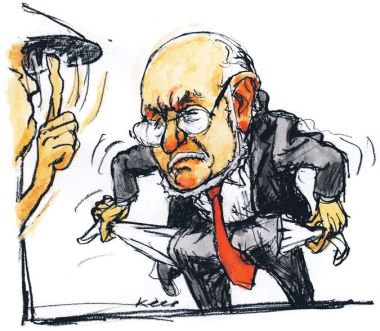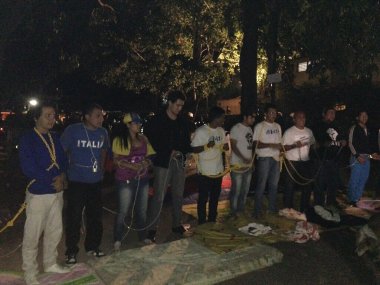
When reader Arco posted this link as a comment, saying (or translating it): “On the border of Holland and Germany in Dusseldorf, a man from Iran was arrested for having a check for 300.000.000 Bsf (54 million euro) from Banco Venezuela in his suitcase. He could not explain why or for whom he had so much money. He risks a fine of more than a million euro. Check is confiscated.”, I found the news so strange, that I not only went to the web, but contacted Caracas’s two largest newspapers to see if they knew anything about it.
But they didn’t.
Then reader Gold, translated a story in Die Welt and I decided to Tweet it, to see if I could get more info on this mysterious matter. Soon afterwards, El Universal published a note, then El Nuevo Herald and soon afterwards, the Iranian Embassy in Caracas tried unsuccessfully to explain the thing away.
Which made it even more intriguing.
Think about it: An Iranian man arrives in Germany from Turkey, fails to report that he is carrying more than 10,000 euros in financial instruments, a check for Bs. 300 million (more than US$ 60 million at the official rate of exchange) is found in his briefcase and he seems to care little if the check is taken from him.
What is wrong with this picture?
1) A check in Bolivars is useless, unless you are in Venezuela, due to the absolute exchange controls the country “enjoys”
2) Why do you need to bring it from Iran, to anywhere? Why not declare it, given that most countries just want to know that you are carrying it, they seldom do much about it. Why take the risk?
3) Why doesn’t he care?
Easy. First of all, this was not just a “man”. This was Tahmasb Mazaheri, a true insider in post revolution Iran, former member of the Iranian Central Bank, former Minister of the Economy and Financial Matters.
Except that the Iranian Embassy in Caracas, says it is not the same Tahmasb Mazaheri, but somebody else. Then Russian webpage Russia Today, reports that the “true” Mazaheri denies having been detained:

except that the Iranian Ambassador comes out and says that there was no irregularity in the check and that the man was indeed the former Minister, who is an adviser to the Kaystor company of Venezuela, who is participating in the “Gran Mision Vivienda” by building 10,000 housing units and recently receiving a new contract for an additional 10,000.
Even aporrea.org, got into the act, saying this is much ado about nothing (can’t find post now) and this is Iran’s heroic aid to Venezuela in building housing.
Then,the local Kaystor company (located in Parque Cristal, Los Palos Grandes) says that the important Tahmasb Mazaheri, has been an advisor to Kaystor for the last year and has been visiting the country every two or three months. That having Mr. Tahmasb Mazaheri carry the check is the same as any “messenger” and there is no irregularity, because the check can not be cashed anywhere but in Venezuela.
Except that the laws are the laws and if you have more than 10,000 euros in cash or financial instruments, you have to declare it in Germany and Mr. Tahmasb Mazaheri, was carrying US$ 69 million at the official rate of Bs. 4.3 per $, US$ 56.6 million at the Sitme rate of Bs. 5.3 per US$ and “only” 16.66 million at what I am told the unnamed black market rate is at today.
Thus, we are told that this is Mision Vivienda money, which we don’t know why the checks have to be written in Teheran and carried by such an expensive messenger.
Except that then we learn in El Mundo (by subscription), that Kayson de Venezuela appears in the Sistema Nacional de Contrataciones as “empresa en proceso de descapitalización”, loosely translated as “Company in the process of losing its capital”, i.e. bankrupt.

and none other than the fascist persecutor of corruption, Diosdado Cabello, says that Kayson built 10,000 housing units and has been hired to build another 7,000, despite being “en proceso de descapitalizacion”. Diosdado’s explanation agrees with the Iranian’s Ambassador explanation. Even more curious by now…
Which gets curioser (does this word exist? I just needed to use it) when you find from El Nuevo Herald, that the man who was not Minister, but was, who was not caught in Germany, but was, is also a member of the Board of Directors of Venezuela’s Banco Internacional de Desarrollo, an affiliate of the Export-Import Bank of Iran, sanctioned by US authorities in 2008 for providing Iran’s Minister of Defense for ways to bypass sanctions against that country.
So, what is going on here? Well, I don’t know, but I can guess. The biggest business in Venezuela today is arbitrage. Ecoanalitica reported on Monday, that fully 40% (Or US$ 8.7 billion) of last year´s public imports were fictitious, just fake, and that US$ 6.6 billion of private imports were also fake, for a total of US$ 15.6 billion or 28% of the total in fake imports.
What does fake means? It means over billing, it means empty boxes imported as if they were full, it means worthless stuff imported and left abandoned at the ports, it means many other things. (Diosdado: If you are so worried about corruption, you may want to look at this, this is REAL money we are talking about!)
But there are also lots of fake financial transactions that take advantage of the same arbitrage. From here on, I am just guessing: The contract to build the houses is an Iran-Venezuela Government-to-Government deal. The Iranian Minister of XXX comes to Venezuela and signs a deal to build YYY housing units for Bs. ZZZZ billion and appoints a company to execute the contract. Venezuela transfers the ZZZZ billion, in US$, at the official rate of exchange of Bs. 4.3 per US$, to whatever account in the world the Iranians want or need. A fraction, is exchanged at the black market rate and sold to someone in Venezuela to get Bs. for the execution of the project, with the remainder, which today is like 75% of the contract, being used by Iran for whatever purposes it needs “clean” money. Except that the guy who signs the Bolivar checks is a big shot in Teheran, who signs the check and sends it over with his high class messenger to give it to the company that supposedly will build the houses.
There are many variations and possibilities, but I bet my guess is not that far from the essentials of the arbitrage underlying this. Venezuela and Iran are involved in arbitrage and laundering via the excuse of building houses, which in the end is not even that relevant.
And therein lies the need to send a check via Germany, drawn in Bolivars via a local bank…















